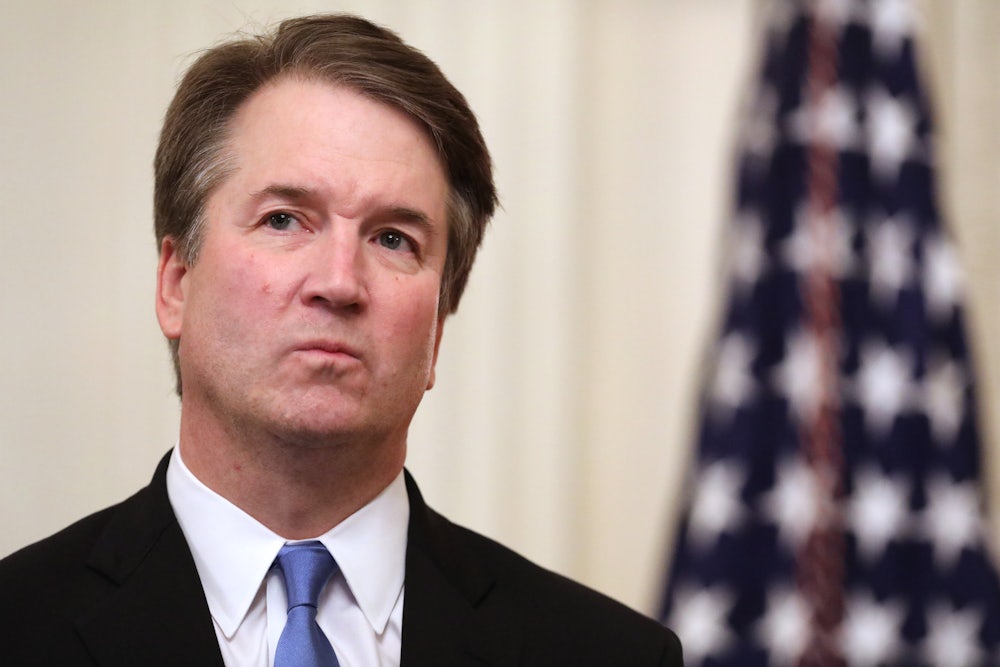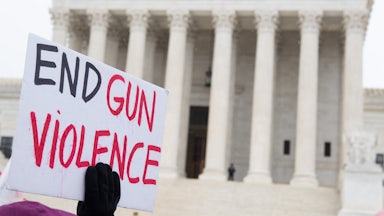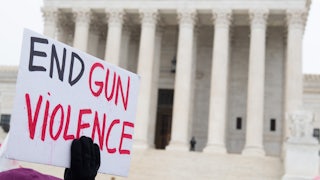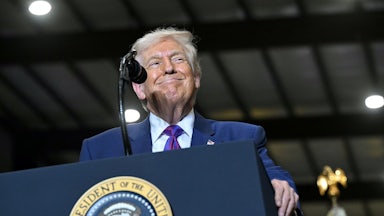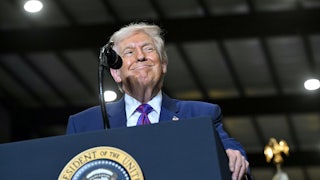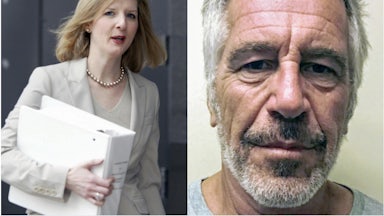Justice Brett Kavanaugh claimed last week that the Supreme Court has good reasons for not explaining itself when deciding pivotal matters on the shadow docket. Those decisions, which are made on shortened timelines and without full briefing or argument, do not reflect the court’s considered judgment at its apex.
“It’s possible we screwed up—very possible, we’re human,” he reportedly told a judicial conference last week. “But it’s also possible, and oftentimes is the case, that it’s the product of nine of us, or at least five of us, trying to reach a consensus or a compromise on a particular issue that might be difficult. I’m fully aware that can lead to a lack of clarity in the law and can lead to some confusion, at times.”
On Monday, he validated that point by writing an alarming concurring opinion where he endorsed racial profiling in immigration enforcement and made a range of bewildering claims about immigration, law enforcement, and the Fourth Amendment.
In Noem v. Vasquez Perdomo, the Supreme Court stayed a lower court order in southern California that had prevented the Trump administration from using racial profiling to stop and question people that it suspected of being undocumented immigrants. The decision came without further comment or explanation by the court itself, though its practical effect will be to green-light racially discriminatory tactics in immigration enforcement throughout the country.
Justice Sonia Sotomayor, joined by the court’s other two liberal members, castigated the court for its intervention. “That decision is yet another grave misuse of our emergency docket,” she wrote. “We should not have to live in a country where the Government can seize anyone who looks Latino, speaks Spanish, and appears to work a low wage job. Rather than stand idly by while our constitutional freedoms are lost, I dissent.”
Starting early this year, the Trump administration carried out what it dubbed as “Operation At Large” in the greater Los Angeles area. ICE agents and other federal law enforcement officials fanned out throughout the city, sometimes accompanied by National Guard reservists who had been federalized by Trump in an authoritarian show of force. Among the tactics they used was stopping people and aggressively questioning them on whether they were U.S. citizens.
The Fourth Amendment generally forbids “unreasonable searches and seizures,” including stops where a person is detained in public. The federal district court held that the vague rationales cited by immigration agents did not meet the threshold of “reasonable suspicion.” To that end, she enjoined the government from making stops that “rely solely on the factors below, alone or in combination.”
Those factors were the person’s “apparent race or ethnicity,” as well as “speaking Spanish or speaking English with an accent,” their “presence at a particular location (e.g., bus stop, car wash, tow yard, day laborer pick up site, agricultural site),” or “the type of work one does.” While this may fit crude, popular stereotypes of undocumented immigrants—White House aide Stephen Miller reportedly demanded that ICE agents focus their efforts on Home Depots and 7-11s earlier this year—they also cover a great many people who are not. Most of the plaintiffs in the case, all of whom were stopped or detained by ICE at one point, identified themselves as U.S. citizens or lawfully present immigrants.
“The Fourth Amendment protects every individual’s constitutional right to be ‘free from arbitrary interference by law officers,’” Sotomayor wrote, quoting from precedent. “After today, that may no longer be true for those who happen to look a certain way, speak a certain way, and appear to work a certain type of legitimate job that pays very little.”
It is impossible to explain the court’s rationale for staying the judge’s order since the majority did not provide one. Kavanaugh’s concurring opinion, which only reflects his own views, is hardly convincing. Some of his assertions and assumptions are starkly at odds with the facts alleged by the plaintiffs in the case itself.
At one point, for example, Kavanaugh minimizes the impact of a law enforcement stop. “Importantly, reasonable suspicion means only that immigration officers may briefly stop the individual and inquire about immigration status,” he claimed. “If the person is a U.S. citizen or otherwise lawfully in the United States, that individual will be free to go after the brief encounter. Only if the person is illegally in the United States may the stop lead to further immigration proceedings.”
Well, that doesn’t sound so bad, does it? Except that’s not even close to what happened to the plaintiffs in this case. The ICE agents who detained them were not Barney Fife types who simply got a little too eager in good faith. They were operating as a paramilitary force of sorts and harassing a significant number of Hispanic Americans for apparently any reason or none at all.
One plaintiff, a Hispanic U.S. citizen, said that masked agents with “military-style rifles” approached him while he worked on his car and asked him multiple times whether he was American and at which hospital he was born. When he couldn’t immediately remember the latter, they pushed him up against a fence, took his phone, and didn’t release him until he gave them his ID, which they subsequently kept.
In another encounter, agents encountered a plaintiff, a dual U.S.-Mexican citizen working at a car wash, and refused to believe the validity of his California driver’s license. “The agent said the ID was insufficient, ‘grabbed [his] arm,’ escorted him to a vehicle, and drove him to a ‘warehouse area’ for further questioning,” Sotomayor recounted in her dissent. “Agents detained [him] for 20 minutes while they made calls to verify his U.S. citizenship and examined his Mexican ID before eventually driving him back to work.” So much for the “brief encounter” of Kavanaugh’s imagination.
Sotomayor pointedly cited testimony from Los Angeles residents who said the raids made them feel unsafe in their own communities, kept them home from work, and even made them hesitant to pick up their own children from school. (ICE has a nasty latent habit of targeting parents during school pickups.) The government did not deny that it was engaging in racially driven tactics, only averring that it trained agents to assess the “totality of the circumstances.”
Obtaining a stay of a lower court order is, in theory, a difficult feat. District courts typically have broad discretion to manage the cases before them. But the Supreme Court has gone to great lengths to make the process as frictionless as possible for the Trump administration over the past nine months. Kavanaugh, citing the court’s recent decision on nationwide injunctions, noted that whenever the government is “enjoined by a court from effectuating statutes enacted by representatives of its people, it suffers a form of irreparable injury.”
Sotomayor rejected that notion altogether. While the government does have the responsibility of enforcing immigration laws, she noted that those laws weren’t at issue here. “At the outset, this TRO plainly does not enjoin the Government from effectuating any statute,” she pointed out in her dissent when addressing Kavanaugh’s point. “No statute authorizes the Government to stop individuals based on these four factors alone.”
Indeed, Kavanaugh’s concurring opinion gave the impression that he wanted to broadly sanction Trump’s anti-immigration efforts as a matter of policy. While the case involved U.S. citizens and lawful immigrants who argued their Fourth Amendment rights were violated, Kavanaugh kept making policy arguments against undocumented immigrants and claiming they had few legal rights for the court to respect.
“In any event, the balance of harms and equities in this case tips in favor of the Government,” he wrote at one point in his concurring opinion. “The interests of individuals who are illegally in the country in avoiding being stopped by law enforcement for questioning is ultimately an interest in evading the law. That is not an especially weighty legal interest.” This is a striking assertion for a Supreme Court justice to make, especially in this case. It is impossible to know on sight whether someone is an undocumented immigrant. If it were possible, this case would not exist.
The broader philosophical implications are also alarming. Most of the Bill of Rights is premised on the idea that preserving Americans’ liberties is a higher-order value than letting the government do anything it wants in the name of law enforcement. Any Fourth Amendment interest, after all, can conceivably be described as “an interest in evading the law.” In his eagerness to defend the government’s anti-immigration campaign, Kavanaugh came perilously close to rejecting the Anglo-American legal tradition entirely.
